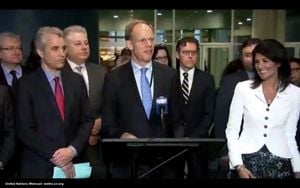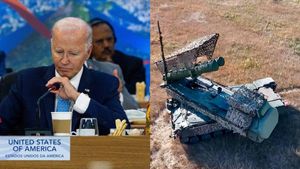After Donald Trump’s unexpected return to the forefront of American politics, the reverberations across the globe are shaking the foundations of international relations. With Trump poised to assume office once again, leaders and analysts alike are grappling with the potential ramifications for geopolitical stability, particularly within Europe. The uncertainty surrounding his administration, especially concerning defense and diplomatic relations, has sparked urgent discussions among European powers and raised significant concerns over the future of alliances.
One prominent voice amid this sea of uncertainty is former French President François Hollande. Speaking candidly, he warned of the need for European military powers such as France, Germany, Poland, and the UK to unite to counter any potential drift away from NATO commitments by the United States under Trump’s leadership. He articulated serious apprehensions surrounding the notion of America becoming distant, which could diminish Europe’s role on the global stage. Hollande emphasized the necessity of collaborative defense strategies among these nations to navigate the perilous waters of changing American foreign policy.
Trump's election campaign has highlighted concerns about his intentions for NATO, particularly when he suggested he would not necessarily defend member countries failing to meet their financial obligations for defense spending. Such talk has sent chills down the spines of many European leaders, who rely heavily on the U.S. security umbrella. According to Hollande, the ramifications could be dire if Europe does not fortify its collective security arrangement amid shifting American priorities. This rearrangement isn’t just about military collaboration; it encompasses economic relations and trade agreements, which could be affected drastically should Trump impose tariffs or legislative changes affecting European goods.
Adding to the complexity, the UK’s geopolitical position has become increasingly fragile. Following Brexit, many are concerned about how relations with the U.S. may evolve under Trump compared to those with the EU. Labor leader Keir Starmer finds himself under pressure to assert Britain’s influence on the global stage, positioning the UK as more than just another European nation sidelined by American whims. Hollande’s advice is clear: Starmer must strive to appear as the unifying European leader, independently addressing Trump’s challenges to establish mutual interests between the UK and EU.
While Europe is actively assessing these geopolitical dynamics, the immediate influence of Trump’s trade policy proposals looms large. Analysts speculate about Trump’s inclination toward imposing tariffs on imports, with his previous statements giving rise to fears of trade wars. For example, he has floated the idea of levying 20% tariffs on all imports and even higher on those from countries like China. These prospects create turmoil not just for goods, but the broader European economy, which might struggle to recover from the shock of another trade conflict with the U.S.
Germany, which has long been seen as the economic powerhouse of Europe, is facing its own vulnerabilities. With the country grappling with energy supply issues and potential political instability stemming from its post-Brexit relationship with the UK, its position demands both strategic maneuvering and united action with other European nations. Similarly, Poland’s President Andrzej Duda remains cautious about alienation from the United States, reaffirming his country’s alliance as fundamentally linked to its sovereignty. This highlights the urgency for these nations to find common ground on both defense and economic policy moving forward.
Tensions are especially pronounced when considering the conflict between Ukraine and Russia. The incursion of Trump’s policies, along with his expressed desire to shift U.S. involvement toward appeasement rather than aggressive support for Ukraine, could diminish the groundwork laid by European countries which have provided billions to support Ukraine against Russian aggression. Recent statements reveal hesitance from Ukraine’s President Volodymyr Zelensky. He has acknowledged the potential for talks under Trump to bring about peace earlier than expected but simultaneously voiced concerns. He described Trump’s withdrawal from NATO's commitments as the opening of "Pandora's Box," indicating the inherent risks embedded within easing sanctions against Russia and allowing territorial gains to remain unchallenged.
The back and forth of international relations showcases how complex and layered these topics have become. While Trump’s supporters view his earlier decisions during his first term as bolstering American interests, many international observers see the potential for retreat jeopardizing established relationships. The dilemma boils down to whether nations like the U.S. can maintain their leadership roles or whether they surrender this responsibility to rival states like China, which may fill the void left by disengaged American foreign policy.
The upcoming G20 summit—where world leaders including Xi Jinping, Joe Biden, and Emmanuel Macron gather—will provide insights as to how these global power dynamics may shift. Diplomats express concern over how Trump’s looming influence could create discord, with varying factions attempting to navigate the potential isolationism of his policies. Observers will be watching closely to see if leaders can find common ground amid diverging national interests.
The theme of cooperation emerges as pivotal with the growth of economic blocs like the BRICS group, where nations such as China, Brazil, and India are suspected to be preparing to strengthen their solidarity. Meanwhile, Argentina’s newly-elected President Javier Milei’s pro-Trump stance has huge implications, as he seeks to diminish multilateral checks on alliances and pursues brokering agreements closely aligned with the former U.S. president's isolationist views. This places the G20’s agenda of solidarity and collective response to global crises under increasing strain, raising the question of whether global efforts can focus on cooperative solutions—even as divisions deepen.
While political chess pieces scramble around each other on the grand international stage, the future of effective synergy among allied countries hangs precariously. Should Trump’s new administration materialize, the ripple effects will bear witness to shifts not just within the U.S.-European closet, but reverberate globally as the familiar balance of power stands to be recalibrated.



